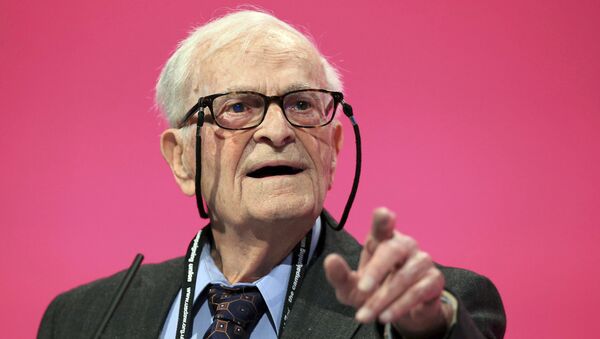The term 'inspirational' is often overused nowadays but there is no hyperbole when it is applied to the extraordinary Harry Leslie Smith. The son of a coal miner, Smith was born in Barnsley, in Yorkshire, in February 1923.
He lost his sister to tuberculosis. He endured great poverty. In those days there was no NHS. Harry never forgot this and in his later years became an outspoken supporter of the public health care system. 'Don't let my past be your future', he would warn.
Very sad news. RIP Harry Leslie Smith. You were truly inspirational. https://t.co/PT9bqCMp4x
— Neil Clark (@NeilClark66) November 28, 2018
He served in the RAF in the war, doing his bit to defeat the Nazis, but unlike a lot of neocon/ 'liberal interventionist' commentators who have never been near a conflict zone in their lives, he campaigned for peace.
He also stood up for the victims of war. He visited a number of refugee camps in Europe and embarked on a global tour, in his tenth decade, to highlight the issue.
What Harry brought to the table was not just his experience of life in pre-WW2 Britain and his memories of the Great Depression, but enormous humanity. He was a genuine internationalist who cared about everybody, whatever their colour or creed. Sadly, I never met Harry in person but we followed each other on Twitter from way back and were friends on Facebook. We sent each other birthday greetings.
A belated but very happy 94th birthday greetings to the remarkable-and inspirational- @harryslaststand. Keep going strong Harry!
— Neil Clark (@NeilClark66) February 27, 2017
Not everyone was so kindly disposed towards Harry. Despite his advanced age, he was the subject of some nasty attacks from neocons and pro-war 'liberals' a few years back. But his attackers came off the worst, I'm pleased to say.
In 2014, at the age of 91, he addressed the Labour Party conference and moved delegates- and I dare say millions more watching on tv- to tears. ‘As you can see I'm not athletic' he joked as he made it up to the podium.
Harry's Labour conference speech was pure magic because he gave the speech he'd been waiting a life time to make and the many listened to him. #IStandWithHarry https://t.co/rbWiaXBSGJ
— Harry Leslie Smith (@Harryslaststand) November 23, 2018
'I can tell you that my childhood, like many of that era, was not like an episode of Downton Abbey', he said.
'Poor Mum and Dad. No matter how hard they tried to protect me and my sisters the cards were stacked against them. No one in our community was safe from poor health'.
He told how his parents could not even afford to bury his poor sister. 'My family's story is not unique. Sadly rampant poverty and no health care were the norms for the Britain of my youth'.
He said that election day in 1945 when he voted Labour and for the creation of the NHS, was one of the proudest days in his life.
Harry lived long enough to see the great, progressive achievements of the post-war era destroyed or threatened with destruction by the neoliberals who first came to power in 1979.
'Today we must demand that the NHS remains always of the people and by the people' he declared to a thunderous reception.
Harry became a strong supporter of Jeremy Corbyn when the left-wing Labour MP became party leader in 2015. He saw that perhaps here was one last chance to end austerity and reverse the wrongs of the last thirty years.
Funny that Tony Blair thinks Jeremy Corbyn is the problem. https://t.co/10Aiq9yVcy
— Harry Leslie Smith (@Harryslaststand) April 7, 2018
How sad it must have been for Harry to see Britain, having made such economic and social progress in the years 1945-79, revert back to the times when the odds were once again stacked against ordinary people. The gap between rich and poor reached historically low levels in the mid-1970s but now it's back again to the 1920s- or even earlier.
Two months before Harry died, a report from the Institute of Public Policy Research detailed the scale of the problem. It showed that more than a fifth of households in Britain lived below the poverty line once housing costs were taken into account. 44% of Britain's wealth was owned by just 10% of the population-amounting to five times the total wealth held by the poorest half.
Then, earlier this month, we had the report of the UN Special Rapporteur on extreme poverty and human rights which painted a shocking picture of life in low-wage Britain: 'For almost one in every two children to be poor in twenty-first century Britain is not just a disgrace, but a social calamity and an economic disaster, all rolled into one‘.
The best way we can honour the remarkable Harry Leslie Smith is to carry on his work and campaign with renewed vigour, for a new, more equitable economic settlement, similar to the one we had in 1945.
The views and opinions expressed by the contributor do not necessarily reflect those of Sputnik.
Follow Neil Clark @NeilClark66 and @MightyMagyar
Support his AntiStalker Crowdfund




